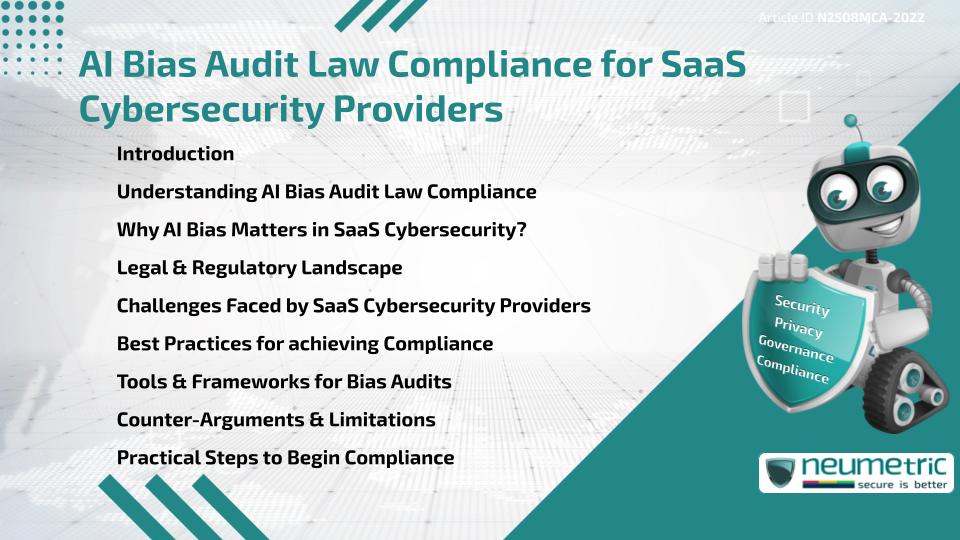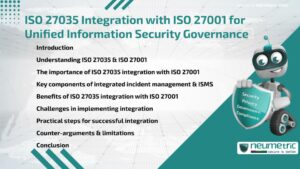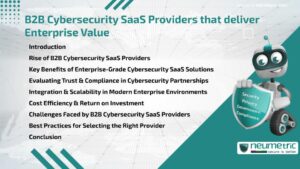Table of Contents
ToggleIntroduction
AI bias Audit law compliance is becoming a critical requirement for SaaS Cybersecurity providers. Governments & regulators now demand transparency, fairness & accountability in Artificial Intelligence systems that impact individuals & Organisations. For SaaS companies operating in the Cybersecurity space, compliance ensures trust, prevents discriminatory practices & avoids regulatory penalties. This article explores why compliance matters, the challenges involved & practical strategies for SaaS Cybersecurity providers.
Understanding AI Bias Audit Law Compliance
AI bias Audit law compliance refers to meeting legal standards designed to minimise bias in AI Systems. Bias can arise from skewed datasets, flawed algorithms or improper implementation. These laws require companies to conduct independent audits, document their processes & provide clear Evidence that their systems do not unfairly discriminate against users or groups. SaaS Cybersecurity providers often rely on AI-driven tools for Threat detection, Risk scoring & Anomaly Detection, making compliance especially relevant.
Why AI Bias Matters in SaaS Cybersecurity?
Bias in Cybersecurity tools can have severe consequences. For example, if an algorithm unfairly flags certain User behaviors as malicious due to biased training data, it may create inefficiencies & reputational Risks. On the other hand, underestimating Risks due to biased detection models can leave Organisations vulnerable to cyberattacks. Ensuring AI bias Audit law compliance in these systems promotes fairness while protecting clients from harm.
Legal & Regulatory Landscape
Several jurisdictions, including the United States & the European Union, have introduced laws to regulate AI bias. The New York City Local Law 144 requires annual bias audits of automated employment decision tools, while the EU AI Act emphasizes Transparency & Accountability. Although not all regulations directly target Cybersecurity, SaaS Providers must still adapt to meet broader AI compliance standards. Non-compliance could result in fines, legal action & loss of Customer Trust.
Challenges Faced by SaaS Cybersecurity Providers
Meeting AI bias Audit law compliance poses unique challenges for SaaS Cybersecurity providers. These include:
- Complexity of AI Models that make them difficult to interpret
- Constantly evolving Cybersecurity Threats requiring rapid AI updates
- Limited availability of unbiased training datasets
- High costs of independent audits & compliance documentation
These challenges often create tension between maintaining system agility & ensuring strict compliance.
Best Practices for achieving Compliance
SaaS Cybersecurity providers can adopt several practices to ensure compliance:
- Implement diverse & representative training datasets
- Use explainable AI Models to enhance transparency
- Conduct regular Third Party audits
- Document all algorithmic decisions & updates
- Train Employees on ethical AI use & Compliance Requirements
By following these steps, companies can reduce Risks while demonstrating commitment to fair practices.
Tools & Frameworks for Bias Audits
Various tools & frameworks support bias audits. Examples include fairness Assessment libraries such as IBM’s AI Fairness 360 & Google’s What-If Tool. In addition, frameworks like NIST’s AI Risk Management Framework provide structured approaches for identifying & mitigating bias. SaaS Cybersecurity providers can integrate these resources into their development lifecycle to achieve AI bias Audit law compliance.
Counter-Arguments & Limitations
Some argue that strict compliance could slow down innovation in Cybersecurity, where speed is essential. Others suggest that eliminating bias completely is impossible, as some level of subjectivity is inherent in AI design. While these concerns are valid, compliance laws focus on reducing harmful bias rather than expecting perfection. SaaS Providers must balance innovation with accountability.
Practical Steps to Begin Compliance
Providers starting their compliance journey can:
- Conduct an internal Risk Assessment to identify bias-prone areas
- Partner with independent Auditors to validate systems
- Create Policies for responsible AI Governance
- Engage clients transparently about AI-driven decisions
Taking these steps positions SaaS Cybersecurity providers as responsible & trustworthy partners.
Takeaways
- AI bias Audit law compliance ensures fairness & accountability in Cybersecurity.
- Non-compliance can result in financial, legal & reputational Risks.
- Best Practices include audits, transparent AI & strong Governance Policies.
- Tools & frameworks are available to guide compliance efforts.
- Compliance strengthens Customer Trust & market reputation.
FAQ
What is AI bias Audit law compliance?
It refers to meeting legal standards requiring companies to Audit & prove that their AI Systems do not unfairly discriminate against users.
Why is AI bias Audit law compliance important for SaaS Cybersecurity?
It ensures AI-powered security tools operate fairly, avoid discrimination & protect clients effectively.
What are the Risks of non-compliance?
Non-compliance can result in fines, lawsuits, reputational damage & loss of Customer Trust.
How can SaaS Providers check for bias?
They can use Audit tools like IBM AI Fairness 360, independent Third Party reviews & regular system monitoring.
Can bias in AI be completely removed?
No, but it can be minimised & managed with proper Governance, audits & training datasets.
What practical steps can providers take toward compliance?
Providers can conduct Risk Assessments, implement transparent models, partner with auditors & train Employees.
Need help for Security, Privacy, Governance & VAPT?
Neumetric provides organisations the necessary help to achieve their Cybersecurity, Compliance, Governance, Privacy, Certifications & Pentesting needs.
Organisations & Businesses, specifically those which provide SaaS & AI Solutions in the Fintech, BFSI & other regulated sectors, usually need a Cybersecurity Partner for meeting & maintaining the ongoing Security & Privacy needs & requirements of their Enterprise Clients & Privacy conscious Customers.
SOC 2, ISO 27001, ISO 42001, NIST, HIPAA, HECVAT, EU GDPR are some of the Frameworks that are served by Fusion – a SaaS, multimodular, multitenant, centralised, automated, Cybersecurity & Compliance Management system.
Neumetric also provides Expert Services for technical security which covers VAPT for Web Applications, APIs, iOS & Android Mobile Apps, Security Testing for AWS & other Cloud Environments & Cloud Infrastructure & other similar scopes. Reach out to us by Email or filling out the Contact Form…





